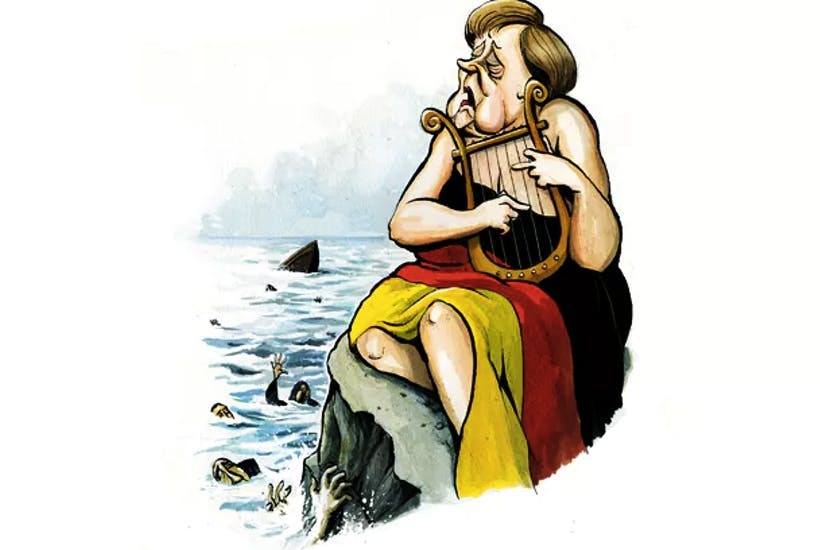How did she do it? How has Angela Merkel hung on for a fourth term as German Chancellor after being written off so many times? When she’s sworn in as Bundeskanzlerin today it’ll be nearly thirteen years since she became leader of the Bundesrepublik. She’s been read the last rites so often, yet after almost six months of backroom talks she’s back in office. But is she really back in power?
Merkel has promised Germany ‘a grand coalition for the little people.’ It’s a catchy catchphrase but can she deliver? Yet another cosy alliance between her centre right CDU and the soft left SPD hardly feels like a new beginning for the millions of voters who deserted the two big parties at last September’s election. Both parties recorded their worst results since the war – 32 per cent for the CDU, 20.5 per cent for the SPD – yet they’re back together again, in a marriage of convenience that neither party really wanted.
Merkel would have preferred a triple alliance with the Green Party and the business friendly Free Democrats. Many prominent SPD members, like the party’s rising star, Youth Wing leader Kevin Kühnert, would have preferred a period in opposition, to rebuild the party’s left wing identity. So will this new GroKo (as Germans call these ‘grand coalitions’) be any different from the one before?
The early signs are that Merkel will finally get tough on immigration. Most of the attention has been on the six ministries that Merkel was forced to cede to the SPD in order to stay on as Chancellor. However her key appointment has been her new Interior Minister, Horst Seehofer, leader of the CDU’s Bavarian sister party, the Christian Social Union.
The CSU has always been more conservative than the CDU, and since Merkel moved her party into the centre, that gap has become a gulf. To survive, Merkel needs to close that gap, and Seehofer’s new role will be crucial. He was a fierce opponent of Merkel’s open door immigration policy – no wonder, when so many of those immigrants entered Germany via Bavaria. His leading role shows how much Merkel needs to appease the CSU to stay in charge.
Significantly, Seehofer’s Interior Ministry has been renamed the Ministry of the Interior, Construction & Homeland – or Heimat, to use the German term. What’s in a name? Well, quite a lot, in this case. Heimat is one of those untranslatable German words for which there’s no English equivalent. Before Germany became a nation, it conveyed a longing for nationhood. It was hijacked by the Nazis, and after the war its use was virtually verboten. Since reunification it’s been creeping back into mainstream political discourse, as a shorthand for a shared sense of belonging, to a particular place with a common culture and a common history – a feeling of community that many Germans fear they’ve lost.
Heimat has become a buzzword for Germany’s new anti-immigration party, Alternative für Deutschland. Herr Seehofer’s new job title shows the centre right are trying to reclaim it. He’s pushing for faster deportation for asylum seekers whose claims have been refused.
At yesterday’s press conference, Merkel struck a conciliatory tone. ‘We’ve all enjoyed the benefits of the Schengen Area, which have allowed us to move freely,’ she said, ‘but when we introduced Free Movement we didn’t think sufficiently about securing our outer borders. That has to happen now.’ Merkel also promised to tackle the causes of migration, a truly Herculean task.
Can Merkel put the migrant genie back in the bottle? Can she undo the damage of the last few years? With Seehofer by her side, the CSU will give her the benefit of the doubt – for now. But the polling power of AfD will be the barometer of her new GroKo. One in eight Germans voted AfD last September. If that number falls, she could serve a full term as Chancellor. If it keeps rising, who knows?


















